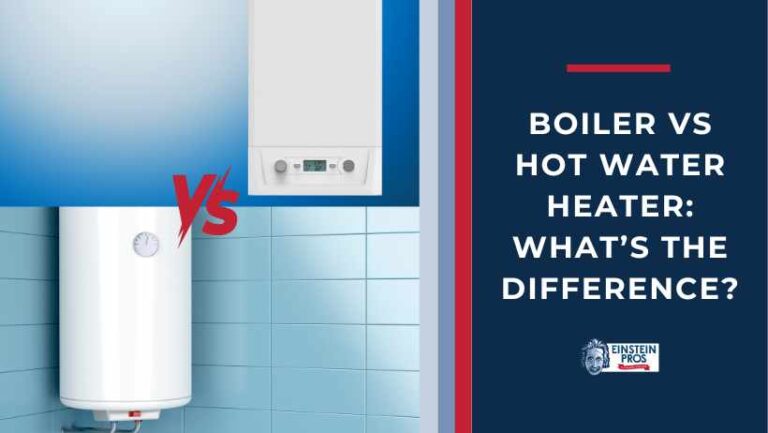When it comes to heating water for various purposes, two common options emerge boilers and water heaters. While both play a crucial role in providing hot water, they operate differently and serve distinct purposes. In this comprehensive guide, we’ll delve into the key factors to differentiate boiler vs hot water heater, helping you make an informed decision for your specific needs.
What are Boilers?
1. Heating Mechanism
- Boilers primarily use hydronic heating systems to generate heat. They heat water and distribute it throughout the building via pipes and radiators.
2. Purpose
- Boilers are designed for space heating, radiators, and in-floor heating systems. They excel in providing consistent warmth to large areas.
3. Efficiency
- Boilers are known for their high efficiency, as they can operate at lower temperatures and distribute heat evenly, reducing energy consumption.
4. Fuel Sources
- Boilers can run on various fuels, including natural gas, oil, propane, or electricity, providing flexibility based on availability and regional preferences.
5. Lifespan
- Boilers generally have a longer lifespan compared to water heaters. Proper maintenance can extend their operational life, making them a durable investment.
What are Water Heaters?
1. Heating Mechanism
- Tankless water heaters heat water on demand, providing instant hot water as needed. They use either electric elements or gas burners for heating.
2. Purpose
- Hot water heaters are designed primarily for domestic hot water needs, such as showers, faucets, and appliances. They are not suitable for space heating.
3. Efficiency
- Hot water heaters are generally efficient for their intended purpose, delivering hot water quickly. However, they may lose efficiency if demand exceeds their capacity.
4. Fuel Sources
- Water heaters are available in electric and gas variations. An electric heater or electric hot water boiler is common in areas with stable electricity, while gas heaters are prevalent in regions with a natural gas supply.
5. Lifespan
- Hot water heaters typically have a shorter lifespan compared to boilers. Regular maintenance from expert plumbers in Seattle is essential to ensure their optimal performance and extend their useful life.
Boiler vs Hot Water Heater: Energy Efficiency
1. Boilers
- Boilers are known for their energy efficiency, especially in hydronic heating systems. They can operate at lower temperatures, reducing energy consumption and promoting a greener approach.
2. Hot Water Heaters
- While hot water heaters are efficient for providing instant hot water, they may experience energy loss during standby periods. Tankless models, however, mitigate this issue by heating water only when needed.
Initial Cost and Installation
1. Boilers
- Boilers typically have a higher upfront cost due to the complexity of the system and installation requirements. Professional installation by skilled and licensed plumbers in Seattle is crucial for optimal performance.
2. Hot Water Heaters
- Hot water heaters generally have a lower initial cost, making them a more budget-friendly option for households. Installation is usually simpler, and DIY options are available for some models.
Maintenance Requirements
1. Boilers
- Boilers require regular maintenance, including flushing the system, checking for leaks, and inspecting pressure levels. Professional maintenance is advisable to ensure efficient operation.
2. Hot Water Heaters
- Water heaters also need periodic maintenance, such as flushing the tank to remove sediment and checking the heating elements. Maintenance tasks are generally simpler compared to boilers.
Space Considerations
1. Boilers
- Boilers, especially traditional ones with tanks, require more space for installation. Adequate ventilation is essential, and the placement of radiators or in-floor heating elements may impact interior design.
2. Hot Water Heaters
- Hot water heaters are generally more compact and can be installed in smaller spaces. Tankless models, in particular, save space as they don’t require a storage tank.
Performance in Cold Climates
1. Boilers
- Hot water boilers excel in cold climates, as they can efficiently heat water to high temperatures. They are ideal for providing consistent warmth in buildings located in regions with harsh winters.
2. Hot Water Heaters
- Hot water heaters may struggle to meet demand during extremely cold weather, especially if they are not adequately sized for the specific climate.
Environmental Impact
1. Boilers
- Boilers, especially those running on natural gas or other clean fuels, can be considered environmentally friendly. Their efficiency and ability to operate at lower temperatures contribute to reduced carbon emissions.
2. Hot Water Heaters
- The environmental impact of hot water heaters depends on the energy source. Electric models may have a higher carbon footprint in areas with coal-based electricity generation.

Additional Considerations When Choosing Between Boiler vs Hot Water Heater
1. Integration with Renewable Energy
Boilers
- Boilers can be integrated with renewable energy sources, such as solar panels or geothermal systems, to further enhance their eco-friendliness. This option aligns with the growing trend of sustainable and green living.
Hot Water Heaters
- Hot water heaters can also be paired with renewable energy, especially electric models. Solar water heaters, for instance, harness the power of the sun to heat water, providing an environmentally conscious alternative.
2. Recovery Time
Boilers
- Boilers typically have a slower recovery time since they need to heat a large volume of water within the system. This may result in a brief delay in hot water delivery, especially during peak usage times.
Hot Water Heaters
- Water heaters, particularly tankless models, boast a quick recovery time as they heat water on demand. This feature ensures a continuous and immediate supply of hot water, making them suitable for households with varying usage patterns.
3. Water Quality Considerations
Boilers
- Boilers are less susceptible to issues related to water quality since they don’t store water. The closed-loop system minimizes the risk of corrosion and sediment buildup.
Hot Water Heaters
- Hot water heaters, especially those with storage tanks, may be more prone to sediment accumulation, affecting both efficiency and the quality of the water. Regular maintenance, including flushing the tank, is essential to address this concern.
4. Noise Level
Boilers
- Boilers, particularly newer models, operate quietly. The distribution of heat through pipes and radiators is generally unobtrusive, making them suitable for quiet and peaceful living spaces.
Hot Water Heaters
- Hot water heaters may produce some noise, especially tankless models that rely on gas burners. However, advancements in technology have led to quieter operations compared to older models.
Which to Choose: Boiler or Hot Water Heater in Seattle
When contemplating the choice between a hot water boiler and a water heater in Seattle, Washington, several region-specific considerations come into play. The climate, energy infrastructure, and local regulations influence the efficiency, performance, and overall suitability of these systems for providing hot water in this Pacific Northwest city.
Climate Considerations:
- Cold Winters:
- Seattle experiences cool, damp winters with temperatures occasionally dropping below freezing. A hot water boiler in Seattle, with its ability to efficiently heat water to higher temperatures, can be advantageous in maintaining a comfortable indoor environment during chilly weather.
- Space Heating Needs:
- Given the cooler climate, the demand for effective space heating is significant. Boilers, designed for hydronic heating systems, are well-suited to address this need, distributing warmth evenly throughout the building.
Energy Infrastructure:
- Availability of Natural Gas:
- Seattle often has reliable access to natural gas, making it a common and cost-effective fuel source for heating systems. Boilers can efficiently operate on natural gas, contributing to both energy efficiency and reduced utility costs.
- Electricity as an Alternative:
- While natural gas is prevalent, Seattle also has a robust electrical infrastructure. An electric water heater or electric hot water boiler may be a viable option, especially for those looking to minimize reliance on fossil fuels and align with the city’s commitment to clean energy.
Regulatory Environment:
- Environmental Regulations:
- Seattle places a strong emphasis on environmental sustainability. When choosing between a boiler and a water heater, considering local regulations and incentives for energy-efficient appliances is essential. Some systems may qualify for utility rebates or incentives for eco-friendly choices.
- Emission Standards:
- Boilers that meet or exceed emission standards align with Seattle’s commitment to air quality. Understanding emission requirements and choosing equipment that complies can be a factor in decision-making.
Water Quality:
- Water Hardness:
- Seattle’s water supply is known for its moderate to high hardness. Water heaters, especially tankless models, may be more susceptible to mineral buildup. Regular maintenance, such as descaling, is crucial for optimal performance.
Cost Considerations:
- Initial Costs:
- Considering the upfront costs of installation is crucial. While water heaters typically have a lower initial cost, boilers may provide long-term savings through energy efficiency, especially in colder climates like Seattle.
- Utility Costs:
- Analyzing the ongoing utility costs associated with natural gas or electricity is vital. Seattle’s energy rates may influence the cost-effectiveness of operating either a hot water boiler or a water heater.
Local Energy Efficiency Initiatives:
- Seattle City Light Programs:
- Seattle City Light, the city’s publicly-owned electric utility, often implements energy efficiency programs. These initiatives may include incentives for upgrading to high-efficiency electric water heaters or utilizing renewable energy sources. Exploring such programs can impact the decision-making process.
- Green Building Standards:
- Seattle has established green building standards to promote sustainability in construction. Choosing a hot water system that aligns with these standards can enhance the overall eco-friendliness of a property.
Adaptability to Renewable Energy:
- Solar Potential:
- Seattle, despite its reputation for rain, has a surprising potential for solar energy generation. Both hot water boilers and water heaters can be integrated with solar thermal systems. Evaluating the feasibility of harnessing solar energy for water heating can contribute to a more sustainable approach.
Seismic Considerations:
- Earthquake Preparedness:
- As Seattle is situated in an earthquake-prone region, seismic considerations are paramount. Ensuring that the chosen hot water system is installed securely, and adhering to seismic building codes, is vital for safety and longevity.
Future Resale Value:
- Market Preferences:
- The local real estate market may exhibit preferences for certain types of hot water systems. Understanding market trends and potential buyer preferences can influence the choice between a hot water boiler and a water heater, impacting the property’s resale value.
Maintenance and Repair Services:
- Availability of Services:
- Considering the accessibility of professional maintenance and hot water repair services for both hot water boilers and water heaters is crucial. Having a system that local technicians are familiar with can expedite repairs and minimize downtime.
Conclusion:
Choosing between a hot water boiler and a water heater in Seattle involves a deep assessment of the local climate, energy infrastructure, regulatory landscape, and environmental priorities. Proper installation, maintenance, and repair of different boilers and water heaters by experienced plumbers at Einstein Pros are needed for a seamless experience in Seattle.
